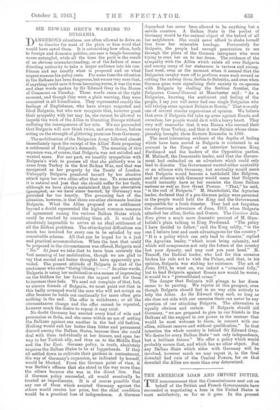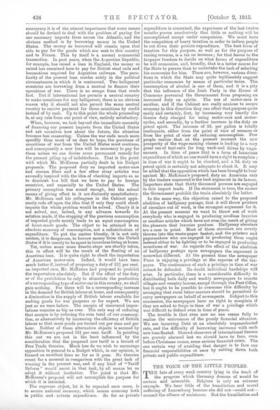THE AMERICAN LOAN AND IMPORT DUTIES. T HE announcement that the
Commissioners sent out on behalf of the British and French Governments have succeeded in negotiating a loan in the United States is most satisfactory, OQ far as it goes. In the present emergency it is of the utmost importance that some means should be devised to deal with the problem of loving for our necessary imports from across the Atlantic, and the obvious method is by borrowing money in the United States. The money so borrowed will remain upon that side to pay for the goods which are sent to this country and to France. This by itself is a normal commercial transaction. In past years, when the Al gentine Republic, for example, has raised a loan in England, the money so raised has remained here to pay for British steel rails and locomotives required for Argentine railways. The pecu- liarity of the present loan resides solely in the political circumstances in which it is contracted. Two belligerent countries are borrowing from a neutral to finance their operations of war. There is no escape from that crude fact. But if international law permits a neutral country to make munitions for any belligerent, there is no obvious reason why it should not also permit the same neutral country to receive payment for those munitions by credit instead of by tub. Up to this point the whole proceeding is, at any rate from our point of view, entirely satisfactory.
When, however, we look beyond the immediate necessity of financing our present imports from the United. States and ask ourselves how about the future, the situation becomes less reassuring. Unless the war ends much more speedily than most of us dare to hope, the purchase of munitions of war from the United States must continue, and consequently a new loan will be necessary to pay for them unless we can devise some permanent remedy for the present piling up of indebtedness. That is the point with which Mr. McKenna, partially dealt in his Budget proposals. The proposed duty on imported motor-cars and cinema films and a few other stray articles was avowedly inspired with the idea of checking imports so as to diminish the bill that we have to pay to foreign countries, and especially to the United States. The primary conception was sound enough, but the actual means of giving effect to it are distinctly unsatisfactory. Mr. McKenna and his colleagues in the Cabinet appa- rently rode off upon the idea that if only they could check imports the whole problem would be solved. Clearly it is not solved, nor, indeed, is any advance towards its solution made, if the stopping of the previous consumption of imported goods merely leads to an equal consumption of home-made goods. The object to be attained is an absolute economy of consumption, not a redistribution of expenditure. To put the matter bluntly, it is not only useless, it is dangerous, to borrow money from the United States if it is merely to be spent in luxurious living at home. Yet, unless some more drastic steps are shortly taken, this in effect will be the result of the floating of an American: loan. It is quite right to check the importation of American motor-cars. Indeed, it would have been much better if, instead of proposing a duty of 331 per cent. on imported cars, Mr. McKenna had proposed to prohibit the importation absolutely. But if the effect of the duty or of the prohibition be only to stimulate the production of a corresponding type of motor-car in this country, we shall gain nothing. For there will be a corresponding increase in the demand for British labour at home, and consequently a diminution in the supply of British labour available for making goods for war purposes or for export. We are just as we were before. The margin of uncovered impor- tations remains as big as ever. The only way of reducing that margin is by reducing the sum total of our consump- tion, or alternatively by increasing the efficiency of British labour so that more goods are turned out per man and per hour. Neither of these alternative objects is secured by Mr. McKenna's proposed 83A per cent, tariff. In pointing this out we are not in the least influenced by the consideration that the proposed new tariff is a breach of Free Trade theories. Much less do we wish to encourage opposition in general to a Budget which, in our opinion, is framed on excellent lines so far as it goes. No theories count for a moment in comparison with the great task of winning in the present war, and if any kind of "Tariff Reform" would assist in that task, by all means let us adopt it without hesitation. The point is that Mr. McKenna's proposal will not accomplish the purpose for which it is intended.
The supreme object, let it be repeated once more, is to secure national economy, which moans economy both in public and private expenditure. So far as Trivet() expenditure is concerned, the experience of the last twelve months proves conclusively that little or nothing will be accomplished except under compulsion. 'We must have the compulsion of heavy taxation in order to induce people to cut down their private expenditure. The best form of taxation for this purpose, as well as for the purpose of raising revenue, is a tax on incomes ; for that leaves to the taxpayer freedom to decide on what forms of expenditure he will economize, and, broadly, that is a better course for the State to pursue than to undertake the task of selecting his economies for him. There are, however, various direc- tions in which the State may quite legitimately suggest particular economies by means of particular taxes. The consumption of alcohol is one of them, and it is a pity that the influence of the Irish Party in the House of Commons prevented the Government from proposing an increased duty on spirits. The use of motor-cars is another, and if the Cabinet are really anxious to secure economy in this direction they can effect that purpose quite easily and certainly, first, by increasing very heavily the licence duty charged for using motor-ears and motor- cycles, and secondly, by a further increase in the duty on petrol spirit. The increase of 3d. per gallon is totally inadequate, either from the point of view of revenue or from the point of view of reducing consumption. Few people realize that at the present moment the new prosperity of the wage-earning classes is leading to a very great use of taxi-cabs for long week-end drives by wage- earners. In time of peace that is a form of luxurious expenditure of which no one would have a right to complain ; in time of war it ought to be checked, and a 3d. duty on petrol spirit is certainly not adequate to check it. It may be added that the opposition which has been brought to bear against Mr. McKenna's proposed duty on American cars by the traders concerned is the best argument in its favour. Importers state that thirty thousand persons are engaged in this import trade. If the statement is true, the sooner the Government prohibit the trade absolutely the better.
In the same way, the objection raised to the proposed abolition of halfpenny postage, that it will throw printers of circulars out of work, is the strongest argument for it. At the present moment we want to throw out of work everybody who is engaged in producing needless luxuries or needless articles which have not even the merit of giving the pleasure that luxuries produce. Halfpenny circulars are a case in point. Most of these circulars are merely thrown into the waste-paper basket, and the printers and papermakers who are engaged in producing them ought instead either to be fighting or to be engaged in producing munitions of war. As regards the effect of the abolition of halfpenny postage upon newspapers the argument is somewhat different. At the present time the newspaper Press is enjoying a privilege at the expense of the tax- payer. The continuance of such a privilege in time of war cannot be defended. No doubt individual hardships will arise. In particular, there is a considerable difficulty in distributing both daily and weekly newspapers to remote villages and country houses, except through the Post Office, but it ought to be possible to overcome this difficulty by arranging that rural letter-carriers should be permitted to carry newspapers on behalf of newsagents. Subject to this concession, the newspapers have no right to complain if they are asked to forgo in time of war a privilege which was difficult to defend even in time of peace.
The trouble is that even now no one seems fully to realize the seriousness of the purely financial situation. We are incurring Debt at an absolutely unprecedented rate, and the difficulty of borrowing increases with each new loan floated. Shrewd observers of international finance are gravely alarmed lest we should have to face, even before Christmas comes, some serious financial crisis. The one certain way of avoiding that danger is to face our financial responsibilities at once by cutting down both private and public expenditure.















































 Previous page
Previous page